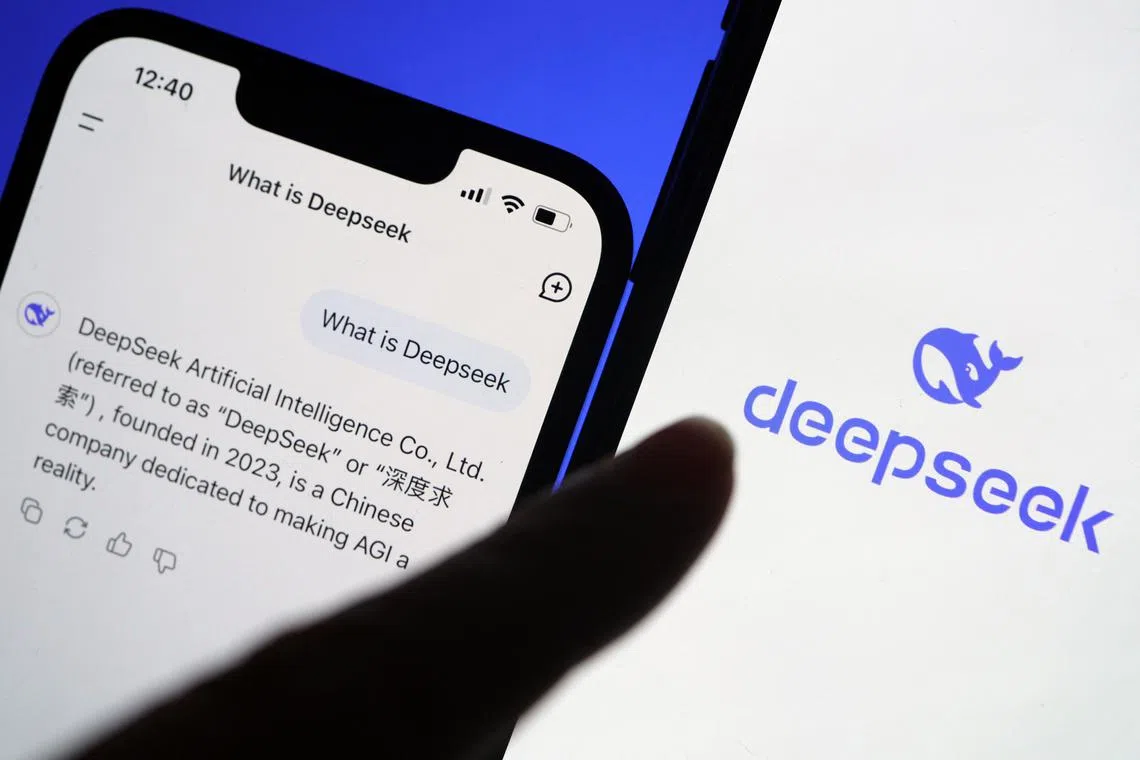China planned DeepSeek’s dramatic debut on world stage to send signal to Trump: US AI expert
Sign up now: Get ST's newsletters delivered to your inbox

DeepSeek released the open-source version of its DeepSeek-R1 model on Jan 20 – the very day US President Donald Trump was inaugurated.
PHOTO: REUTERS
Follow topic:
WASHINGTON – The dramatic debut of Chinese artificial intelligence (AI) software DeepSeek, which triggered a deep sell-off in US stocks on Jan 27, was timed to land during US President Donald Trump’s first week in office, according to an expert.
“That is not a coincidence,” noted Dr Gregory Allen, director of the Wadhwani AI Centre at the Centre for Strategic and International Studies, speaking about the new open-source reasoning model which sliced the valuation of American chipmaker and stock market darling Nvidia by about US$600 billion (S$812 billion) in a matter of hours.
“DeepSeek’s paper came out weeks ago, but they released the open version of the system during Mr Trump’s first week in office,” said Dr Allen, formerly the director of strategy and policy at the Pentagon’s Joint Artificial Intelligence Centre.
“I am confident DeepSeek was told to release it during Mr Trump’s first week,” he said in an interview with The Straits Times.
DeepSeek released the open-source version of its DeepSeek-R1 model on Jan 20 – the very day Mr Trump was inaugurated.
The app rapidly became the most downloaded free app in the US market and 51 other countries.
The DeepSeek AI model, which is said to at least match or even surpass OpenAI’s ChatGPT o1 on key benchmarks, operates at a fraction of the billions that US AI companies such as Meta, Alphabet and others have spent on Nvidia chips to upgrade their hardware.
Mr Trump said Chinese AI could act as a spur for the US companies to innovate.
“Hopefully, the release of DeepSeek AI from a Chinese company should be a wake-up call for our industries that we need to be laser-focused on competing to win,” Mr Trump told a Republican congressional retreat in Miami.
“I would say that could be a positive,” he said. “So, instead of spending billions and billions, you will spend less, and you will come up with, hopefully, the same solution.”
The release could have been timed to make a splash and to persuade Americans that it is fruitless to impose restrictions on the export to China of advanced semiconductor chips, semiconductor manufacturing equipment and other related technologies, said Dr Allen, the former Pentagon official.
These export controls, which were first imposed at the beginning of Mr Trump’s first term and intensified during the Biden administration, are intended to curb China’s ability to compete with the US on cutting-edge technology.
DeepSeek’s debut in the US took a page out of the playbook used by Beijing in August 2023, when Huawei released its latest phone to coincide with the visit to China by then Commerce Secretary Gina Raimondo, Dr Allen said.
The release of Huawei’s Mate 60 Pro smartphone during Ms Raimondo’s visit was seen as a deliberate move by the Chinese company to showcase its achievement of making a 5G-capable phone powered by a chip designed and made in China.
It also allowed China to make a none-too-subtle statement that it may have found a way to overcome American export controls.
In 2019, during Mr Trump’s first term, the US had begun to levy a series of sanctions on the cellphone company to deny it access to advanced chip designs and the availability of Taiwan’s foundries to make them.
But DeepSeek’s current gambit may have backfired because its chief executive Liang Wenfeng identified export controls as his top challenge in a public interview, Dr Allen said. “That is not because export controls don’t work. It is because they do,” he said.
Dr Allen claimed “limitations” were already visible, pointing out that DeepSeek had stopped accepting new customers within days of its launch. “Only people in China can register to use it. They are claiming it is because there is a cyber attack, but I give that little credence,” he said.
“They have to cut off new sign-ups because they don’t have the computing power to serve massive numbers of customers,” he said, pointing out that DeepSeek would eventually hit a chips crunch.
Mr Abhishek Gupta, founder of Rockstar Automations, an AI telecom start-up in Silicon Valley, said DeepSeek was a game changer on a strong growth trajectory. But it could face a ban.
“It is cheaper, open source and fundamentally designed for growth. But if it continues on this trajectory, I would expect it to become a threat, given the stance that the government here has taken with regard to safeguarding citizens,” said Mr Gupta, who co-founded Singapore-based digital telecoms provider Circles.Life.
“I think it is problematic from multiple angles. It takes information from Americans, and there is no control over that. We don’t know about the tonality of its answers and how it shapes narratives,” he said.
Mr Gupta also drew parallels between DeepSeek and TikTok, which was banned by the US on national security grounds. The social media platform can continue in the US market only if it divests itself of the stake held by its Chinese parent ByteDance, and is currently in talks with prospective buyers.
“So, will it (DeepSeek) be allowed to exist here?” he asked.
Already, DeepSeek is attracting criticism for not providing any information on topics China considers sensitive, like the 1989 Tiananmen Square protests.
Still, it has stirred up a wave of excitement in Silicon Valley, where it drew some comparisons with OpenAI’s much-anticipated new tool called Operator. It can perform tasks autonomously, like shopping for groceries. But the agent AI is slow, prone to errors and not as responsive, according to some users.
Mr Steven Li, a Singaporean analytics expert based in Sunnyvale, California, said: “OpenAI’s Operator came out on Thursday evening (Jan 23) and we started looking into it, but it has proved to be a slight disappointment.
“Then, DeepSeek started making the rounds around the internet on Friday morning and everybody was saying, this is much better. It was all we could talk about over the weekend.”
Mr Li said: “The stocks for American AIs took a hit and company executives must be worried. But, from a technologist’s perspective, we are happy that there is one more option.”
Bhagyashree Garekar is The Straits Times’ US bureau chief. Her previous key roles were as the newspaper’s foreign editor (2020-2023) and as its US correspondent during the Bush and Obama administrations.


